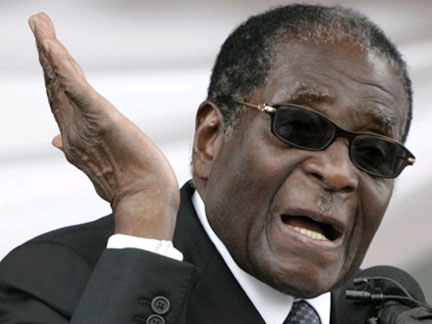By Eric King-
Former Zimbabwean president, Robert Mugabe’s days are numbered after being placed on house arrest by the Zimbabwe military in the capital Harare.
Troops have been patrolling the capital, Harare, after they seized state TV, as part of their targeting of criminals.
Heavy gun and artillery fire could be heard in northern parts of Harare early on Wednesday.
93 year old Mugabe has unilaterally dominated Zimbabwe’s political scene since it gained independence from the UK in 1980. He has refused to pave the way for others to rule, operating a dictators regime ever since he rose to power.
The move is believed to be a bid to replace Mr Mugabe with his sacked deputy, Emmerson Mnangagwa. Sacked Mnangawa was expected to be replaced by Mugabe’s wife, Grace; a replacement that would have presented his wife as a proverbial re-incarnation of Mugabe himself. She would likely have been influenced by her husband in many ways, a presidential appointment of such nature would have been a travesty.
Heavy gun shots were heard during the early morning from Harare’s northern suburbs, where Mr Mugabe and a number of government officials have been held hostage in detention. South Africa’s president , Zuma, is said to havespoken to Mugabe on phone and confirmed his well being.
In a statement, Mr Zuma’s office said:
“President Zuma spoke to President Robert Mugabe earlier today who indicated that he was confined to his home but said that he was fine.”
A Zimbabwean army officer, Maj Gen Sibusiso Moyo, went on Zimbabwen national television after the takeover to say Mr Mugabe and his family were “safe and sound and their security is guaranteed”.
The military takeover signals the departure from power of Mugabe- the world’s oldest man in power
.
Zimbabwe’s opposition has unsurprisingly not publicly condemned the military move. Nelson Chamisa, the deputy head of the opposition MDC party, called for “peace, constitutional-ism, democratisation, the rule of law and the sanctity of human life”.
Tendai Biti, an opposition leader, called for a “roadmap back to legitimacy”.
“What is key is that a traditional authority is set up which is inclusive with the opposition and the ruling party … We need a dialogue too with [regional organisations], the African Union and the United Nations. We can’t solve this problem on our own,” Biti said.
The UK Foreign Office advised Britons:
“currently in Harare to remain safely at home or in their accommodation until the situation becomes clearer”, while the US embassy in Harare advised US citizens in Zimbabwe to “shelter in place” until further notice. They will be heeding that advice.
HISTORY
Robert Mugabe chaired Zimbabwe’s African National Union from 1975 to 1980, and led Zimbabwe as prime minister between 1980 and 1987. He worked as a school teacher in Southern Rhodesia, Northern Rhodesia, and Ghana, after being educated at Kutana College and University of Fort Hare. Born to a poor Shona family in Kutana, Mugabe’s rise to power was impressive, but his style was oppressive and tyrannic. He took exception to the fact that Southern Rhodesia was a British colony governed by a white minority, and campaigned with African nationalists for an independent black-led state.
He was imprisoned between 1964 and 1970 for sedition because of anti nationalist comments he made. he was convicted. He eventually fled to Mozambique, where he established his leadership of ZANU, spearheading their role in the Rhodesian Bush War against Ian Smith’s predominantly white government. After the Lancaster House Agreement initiated by the British Government , dismantling white minority rule, Mugabe won the 1980 general election, leading the ZANU-PF to victory and becoming Prime Minister of Zimbabwe.
Under his immediate administration, health care and education thrived, but his leadership was soon dogged by economic mismanagement, corruption, and electoral fraud relating to his re-election in 2002, 2008, and, 2013. Many Zimbabweans hail him as a national hero who rescued them from colonialism, but he is also condemned for heavy discrimination against Whites in Zimbabwe and several human right abuses including the death of millions of Zimbabweans. His house arrest and the effective end of his regime which he hoped to continue through his wife, is one to be most welcomed and celebrated.




